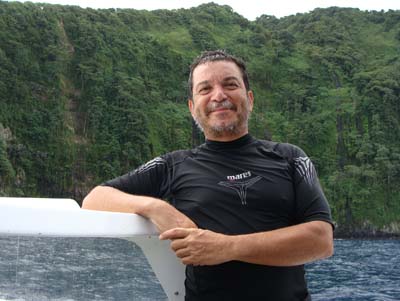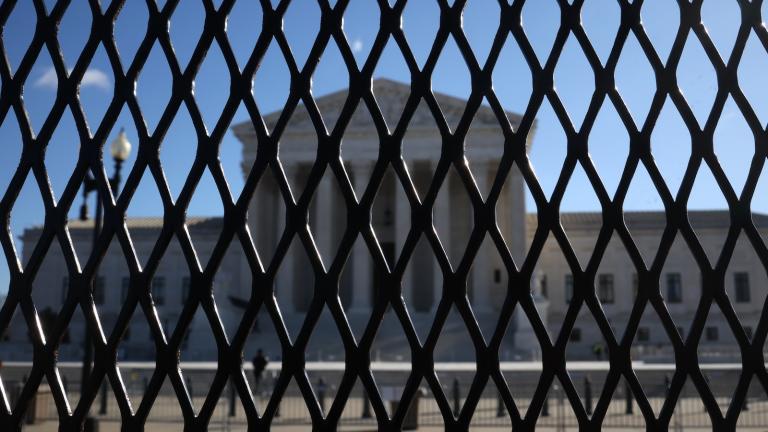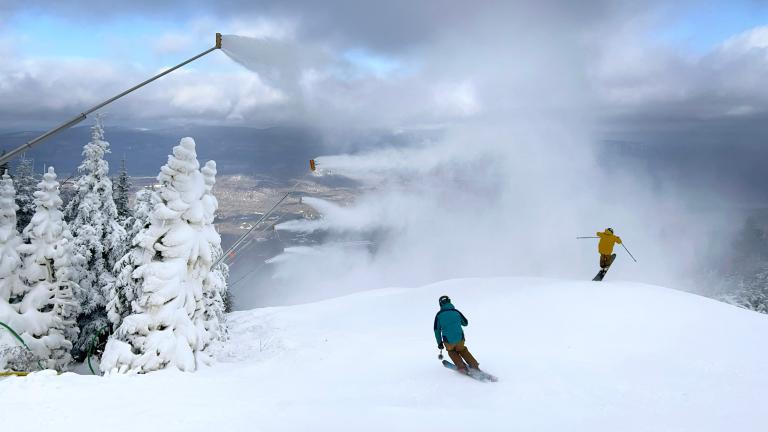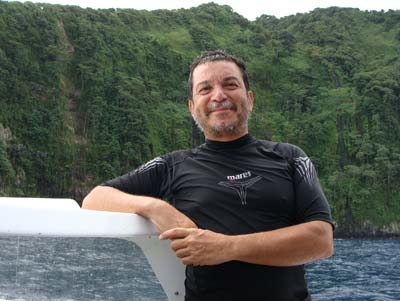 Randall ArauzPhoto: PretomaDue to its location on the Pacific, Costa Rica has a huge number of sharks, and has been a leading exporter of shark fins for the fin soup trade. Fighting this practice is Randall Arauz, founder of the grassroots conservation group Pretoma which works to bring the country’s reputation for marine conservation in line with its high pedigree for terrestrial conservation.
Randall ArauzPhoto: PretomaDue to its location on the Pacific, Costa Rica has a huge number of sharks, and has been a leading exporter of shark fins for the fin soup trade. Fighting this practice is Randall Arauz, founder of the grassroots conservation group Pretoma which works to bring the country’s reputation for marine conservation in line with its high pedigree for terrestrial conservation.
Randall exposed the extent and barbarity of finning in Costa Rica which led to changes in its laws such that all sharks must be brought to land with fins attached and foreign vessels cannot land their catch on private docks, but public ones where their catch can be inspected. For this work he was recently awarded the Goldman Environmental Prize. The law also orders the Ministry of Transportation, Ministry of Revenue (Customs), Ministry of Agriculture (Incopesca), and Environment Ministry to halt all landings of shark products in private docks that were not equipped with public infrastructure. This ruling still isn’t abided by.
I recently caught up with him to see how the campaign is going.
Q. What was it like to hear you won the Goldman Environmental Prize?
A. The prize was a big deal, and it came at the right moment. I have been directing this shark finning campaign for 8 years already, and in spite of enjoying several major victories in the policy field, we still sadly watch foreign fleets devastate regional shark populations in conspiracy with local authorities. This prize rewards years of patience and perseverance. I had heard of the Goldman Award many years ago. In 2004, I won the Whitley Fund for Nature Award (U.K.), together with Ka Sah Wah, another Goldman Laureate. I have also worked in the past with Jorge Varela, of Honduras, another Goldman Award winner (1999) on shrimp farming and mangrove conservation issues.
Q. How has winning the prize changed your work and activism?
A. It has definitely given Pretoma a fresh breath of air. The private dock issue and shark finning is a complicated one, that will wane and disappear if not given the proper follow up. However, keeping the issue alive and maintaining the interest of the press has been a major challenge. With the Goldman Prize, new doors opened, mainly at the high political level in Costa Rica. Also, I have been approached by several potential funders to do more shark finning campaign work. But the work now is just as hard as it has always been because we are interfering with major interests that are well represented in official entities.
Q. I imagine you were disappointed by the decision to list no new sharks under CITES as endangered recently.
A. It was definitely a missed opportunity. Sharks don’t have a lot of time, and now having to wait for another three years won’t be good. At Pretoma, we want Costa Rica to list hammerhead sharks in Appendix III, and through our Foreign Affairs Ministry we want Costa Rica to promote this action to be taken by other countries of the region, which will prepare us for a voting bloc during the next CITES.
Q. What kinds of sharks are most impacted by finning in your region?
A. Scalloped Hammerhead sharks (Sphyrna lewini) are always finned because they have large fins and the body has absolutely no value at the docks. Black tip shark (Carcharhinus limbatus) is heavily targeted in coastal waters for both fins and meat, with high juvenile mortality. Also Oceanic White tip shark (Carcharhinus longimanus). They have large fins and no value for the body.
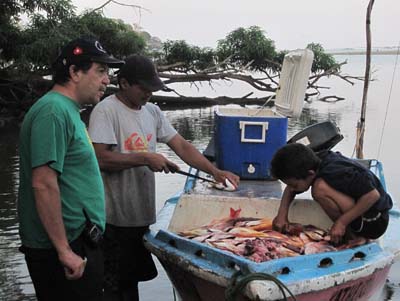 Arauz speaking with local fishers. Photo: Will ParrinelloQ. After you won the prize, you met with outgoing President Arias, and he said that he would see to the closing of the private docks before he left office. He did not seem to keep his word.
Arauz speaking with local fishers. Photo: Will ParrinelloQ. After you won the prize, you met with outgoing President Arias, and he said that he would see to the closing of the private docks before he left office. He did not seem to keep his word.
A. Oscar Arias has met with me 3 times, twice as president and once only a month ago, to continue talks regarding the private dock issue. On May 6, I met with him and the Ministers of Transportation, Customs, and Agriculture, and they all put the blame on Transportation. The Minister agreed to close the docks in one week. He didn’t. When I complained, Arias asked me to meet him again, along with the Director of Ports from the Ministry of Transportation. They then provided a legal document which affirms that the Ministry has no jurisdiction. This means Customs or Incopesca has to do it. I’m now asking Arias to help me get the other Ministers to justify their acts, but he is no longer president.
I also called on Laura Chinchilla, our new president, and she referred the case to Alfio Piva, the vice president. So, things are moving, but this has the potential of lingering on forever.
Q. Is the issue of shark finning continuing to dominate your time?
A. The issue is still important, but it doesn’t dominate my time. We are working on creating marine potected areas (MPAs) in the Guanacaste region, where we have already created two protected areas in collaboration with the Ministry of the Environment. In these areas, fishing is restricted to bottom longlines and hand lines that target snapper. And shrimp trawling, gill netting, and compressor diving are forbidden. We are working on obtaining certification for these snapper fishermen from the Marine Stewardship Council.
We are tagging sea turtles and sharks with acoustic and satellite telemetry in Cocos Island National Park and in coastal waters. We want a larger MPA around Cocos Island, and more MPAs to protect sea turtles in coastal waters from shrimp trawlers.
We are also working with researchers from the University of Hawaii on hook technology and have developed one that facilitates the release of sea turtles from longlines without having to land them.
Q. What are you hopeful about?
A. That many Costa Rican fishermen acknowledge that a change must occur, because the ocean’s resources are finite.
Q. What are you working on now?
A. We need our politicians to understand that Costa Rica’s reputation is at stake, and the world is watching as it allows foreign flagged fleets to fin sharks to extinction. We will launch a campaign this fall for the closure of private docks in Costa Rica and that will strengthen and consolidate our country’s efforts to attain a global “fins attached” policy.
We have filed suit in every Costa Rican court (Constitutional Court, State Comptrollership), the Environment Commission of the Congress, and the Ombudsman’s Office, and have won in every case. The mandate is quite simple, foreign vessels must land in public facilities, it’s the only way to protect the public interest. However, the govern
ment institutions charged with protecting the public interest in public docks each deny authority to take action. As long as this major loophole is left wide open, efforts carried out by our Foreign Affairs Ministry to promote a global “fins attached” policy in international fora are weakened.
I want Costa Rica to be a global marine conservation leader, and so its foreign policy must be congruent with its domestic policy on finning.
Keep up with Randall’s work on this and other marine issues at Pretoma’s blog.

